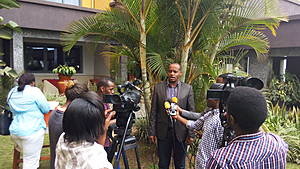RSB Organizes Workshop on the Contribution of Standards in Assuring the Quality and Safety of Cereals and Cereal Products in Rwanda

Mr. Antoine Mukunzi of RSB in the Media Brief
Today, on 16th December, 2016 Rwanda Standards Board (RSB) has convened Workshop on the contribution of Standards in Assuring the Quality and Safety of Cereals and Cereal Products in Rwanda. The workshop brought together members of the Academia, researchers, public institutions in charge of agriculture development, standardizers and business organizations in trade of cereals and cereal products. The workshop was co-organized in partnership with the East African Grain Council (EAGC).
Cereal production and consumption has increased significantly in Rwanda. This is partially as a result of the agriculture transformation as stated in the Economic Development and Poverty Reduction Strategy (EDPRS) 1 and 2 documents. The Ministry of Agriculture and Animal Resources (MINAGRI) informs that some of the strategies resorted to include the change of traditional cropping to commercial agriculture systems, with the aim of fighting hunger and reducing poverty during the spell of EDPRS1 and 2. For instance, MINAGRI (2011) noted that the notes that maize land production has increased by more than 400% (MINAGRI 2011) and Food and Agriculture Organization (FAO, 2016) declares that this has resulted in increased maize productivity from 166 853 Tons in 2008 to 667,833 Tons in 2013. Wheat area has increased to almost 600%, thought the productivity just doubled. Despite such great move to boost cereal industry, high moisture levels, biochemical reactions, microbial growth and toxin formation to challenge the quality of industrial produce.
Challenges in cereal industry
Cereal industry in Rwanda has experienced a wide range of challenges. Some of those are associated with processing technologies, packaging materials, storages facilities and market systems, while others have been linked with the environmental conditions. For instance, some regions in Rwanda experience significant rains, humidity and temperature variations. The North Western region of Rwanda experiences very cold and wet weather because of its very elevated lands. Cereals produced in this area are likely to have high moisture content and microbial loads than dry areas of Eastern province of the country.
Furthermore, some of the cereal processing technologies require water addition so as to easily remove the outer skins of grains before milling, yet, they are unlikely dry off water to the required moisture limits in the final products. Moreover, market systems are characterized by exposing cereal products to attract consumers and this is likely to compromise the objective quality of the products. In addition, some cereal products are packaged in non-moisture proof bags; which hence facilitate moisture exchange with the surroundings under the thermodynamic principles. As a result, high moisture content in the final products may be present and is associated with microbial growth, biochemical reactions, cereal rots, decay and toxin development leading to poor quality products while putting consumers at high risk.
RSB is actively involved in ensuring cereals and cereal products’ quality and safety control
In the context of supporting cereal industry through standardization and enforcing regional integration, RSB, being the National Standards Body for Rwanda has represented the country in developing and harmonizing standards on cereals within the East African Community (EAC) Member States. The EAC Member States have set moisture limits in cereals and cereal products between 13% and 13.5% depending on the type of cereals.
Study based on Standards users and implementers’ perception being conducted
“For better decision-making on how to effectively set up and implement standards across the value chain on the one hand, and on the other hand ensure that Made in Rwanda products, RSB has started the new approach that consists of assessing the standards uptake, challenges and customizing their usability to the existing market situation but also considering requirements on regional and international markets.
In this regard, a study is being conducted in the cereals and derived products sector to ensure that cereals grown in Rwanda and derived products comply with standards and are able to compete at foreign markets. “This initiative intends to explore cereal processors’ perceptions on the use of standards in their businesses. It also intends to determine the impact of processing technologies on moisture and microbial variations in cereals.
The study will also compare moisture-testing techniques available and those used in the industry. Lastly, the study will establish the geographical variation in moisture in cereals produced in Rwanda” reiterated Antoine Mukunzi, National Quality Testing Laboratories Division Manager at the occasion of official opening of the workshop bringing together all stakeholders involved in the value chain.
It is expected that findings would establish the base for development and review of standards, regulations and guidelines. They would also be used to suggest other handling and processing approaches that might better be adopted by cereal industry and guarantee that the quality and safety standards requirements are met. The successful application of new approaches would reduce moisture levels, microbial levels and toxin production in the cereal supply chain. The study will as well ensure that consumers are satisfied with quality of purchased cereals and cereal products and sustainable business growth.